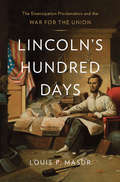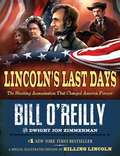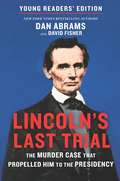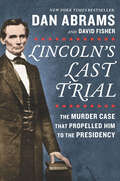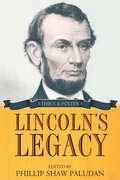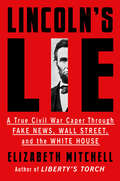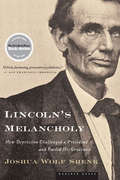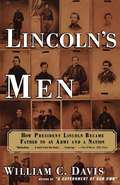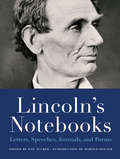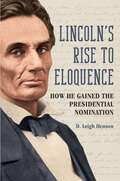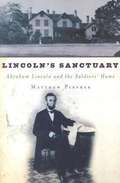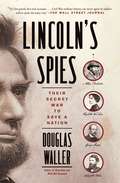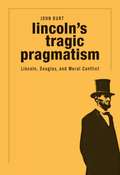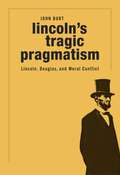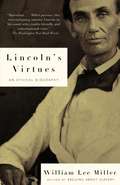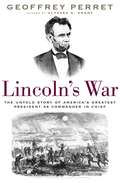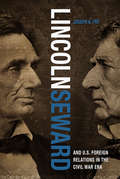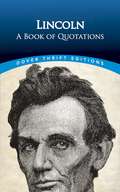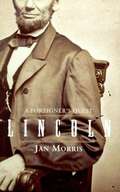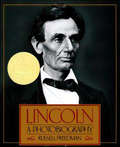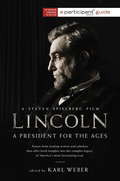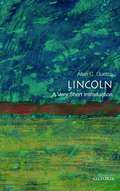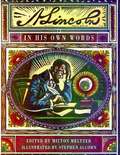- Table View
- List View
Lincoln's Hundred Days: The Emancipation Proclamation and the War for the Union
by Louis P. MasurLincoln’s Hundred Days tells the story of the period between September 22, 1862, when Lincoln issued his preliminary Proclamation, and January 1, 1863, when he signed the significantly altered decree. As battlefield deaths mounted and debate raged, Lincoln hesitated, calculated, prayed, and reckoned with the anxieties and expectations of millions.
Lincoln's Last Days: The Shocking Assassination That Changed America Forever
by Bill O'Reilly Dwight Jon ZimmermanLincoln’s Last Days is a gripping account of one of the most dramatic nights in American history—of how one gunshot changed the country forever. Adapted from Bill O’Reilly’s bestselling historical thriller, Killing Lincoln, this book will have young readers—and grown-ups too—hooked on history.<P><P> In the spring of 1865, President Abraham Lincoln travels through Washington, D.C., after finally winning America’s bloody Civil War. In the midst of celebrations, Lincoln is assassinated at Ford’s Theatre by a famous actor named John Wilkes Booth. What follows is a thrilling chase, ending with a fiery shoot-out and swift justice for the perpetrators.<P> With an unforgettable cast of characters, page-turning action, vivid detail, and art on every spread, Lincoln’s Last Days is history that reads like a thriller. This is a very special book, irresistible on its own or as a compelling companion to Killing Lincoln.
Lincoln's Last Trial Young Readers' Edition: The Murder Case That Propelled Him to the Presidency
by David Fisher Dan AbramsAt the end of the summer of 1859, twenty-two-year-old Peachy Quinn Harrison was accused of murder in Springfield, Illinois. The man hired to save his life was none other than self-taught lawyer Abraham Lincoln. But what would be Lincoln’s last case before his presidency posed many personal challenges. The murder victim had been an apprentice in Lincoln’s law office. The accused murderer was the son of a close friend and loyal supporter. To win the trial, Lincoln would have to form an unholy allegiance with a longtime enemy, a revivalist preacher he had twice run against for political office. And with the rise of newspapers, the nation was watching the presidential hopeful very, very closely.Based on actual court transcripts that include Lincoln’s own words and adapted from Dan Abrams and David Fisher’s New York Times bestseller, Lincoln’s Last Trial is both a twisty, turny true crime story and a vivid picture of Abraham Lincoln on the eve of his presidency. This thrilling, never-before-seen look at one of the most beloved figures in US history will captivate both young readers and adults alike.
Lincoln's Last Trial: The Murder Case That Propelled Him to the Presidency
by David Fisher Dan AbramsThe award-winning, New York Times–bestselling chronicle of the sensational murder trial that would be the capstone of Lincoln’s legal career.In the summer of 1859, twenty-two-year-old “Peachy” Quinn Harrison went on trial for murder in Springfield, Illinois. When Harrison’s father hired Abraham Lincoln to defend him, the case took on momentous meaning. Lincoln’s debates with Senator Stephen Douglas the previous fall had transformed the little-known, self-taught lawyer into a respected politician of national prominence. As Lincoln contemplated a dark-horse run for the presidency in 1860, this case involved great risk. A loss could diminish Lincoln’s untarnished reputation. But the case also posed painful personal challenges for Lincoln. The victim had been his friend and his mentor. The accused killer, whom Lincoln would defend, was the son of a close friend and loyal supporter. And to win this trial he would have to form an unholy allegiance with a longtime enemy, a revivalist preacher he had twice run against for political office.Lincoln’s Last Trial vividly captures Lincoln’s dramatic courtroom confrontations as he fights for his client—but also for his own blossoming political future. It is a moment in history that shines a light on our legal system, our history, and one of our greatest presidents.A Winner of the Barondess/Lincoln Award
Lincoln's Legacy: Ethics and Politics
by William Miller Mark Summers Phillip S. Paludan Mark E. Neely Jr.The four new essays in Lincoln's Legacy describe major ethical problems that the sixteenth president navigated what can be learned from how he did so. The distinguished and award-winning Lincoln scholars William Miller, Mark E. Neely Jr., Phillip Shaw Paludan, and Mark Summers describe Lincoln’s attitudes and actions during encounters with questions of politics, law, constitutionalism, patronage, and democracy. The remarkably focused essays include an assessment of Lincoln's virtues in the presidency, the first study on Lincoln and patronage in more than a decade, a challenge to the cliché of Lincoln the democrat, and a study of habeas corpus, Lincoln, and state courts. On the eve of the bicentennial celebration of Lincoln’s birth, Lincoln’s Legacy highlights his enduring importance in contemporary conversations about law, politics, and democracy.
Lincoln's Lie: A True Civil War Caper Through Fake News, Wall Street, and the White House
by Elizabeth MitchellThis &“delicious, suspenseful . . . and cleverly written romp through a dramatic and forgotten moment in American history&” reveals how Lincoln manipulated the media during the Civil War—shining new light on the current &‘fake news&’ crisis (Elizabeth Gilbert) In 1864, during the bloodiest days of the Civil War, two newspapers published a call, allegedly authored by President Lincoln, for the immediate conscription of 400,000 more Union soldiers. New York streets erupted in pandemonium. Wall Street markets went wild. When Lincoln sent troops to seize the newspaper presses and arrest the editors, it became clear: The proclamation was a lie. Who put out this fake news? Was it a Confederate spy hoping to incite another draft riot? A political enemy out to ruin the president in an election year? Or was there some truth to the proclamation—far more truth than anyone suspected? Unpacking this overlooked historical mystery for the first time, journalist Elizabeth Mitchell takes readers on a dramatic journey from newspaper offices filled with heroes and charlatans to the haunted White House confinement of Mary Todd Lincoln, from the packed pews of the celebrated preacher Reverend Henry Ward Beecher&’s Plymouth Church to the War Department offices in the nation&’s capital and a Grand Jury trial. In Lincoln&’s Lie, Mitchell brings to life the remarkable story of the manipulators of the news and why they decided to play such a dangerous game during a critical period of American history. Her account of Lincoln&’s troubled relationship to the press and its role in the Civil War is one that speaks powerfully to our current political crises: fake news, profiteering, Constitutional conflict, and a president at war with the press.
Lincoln's Melancholy: How Depression Challenged a President and Fueled His Greatness
by Joshua Wolf ShenkA nuanced psychological portrait of Abraham Lincoln that finds his legendary political strengths rooted in his most personal struggles. Giving shape to the deep depression that pervaded Lincoln's adult life, Joshua Wolf Shenk&’s Lincoln&’s Melancholy reveals how this illness influenced both the President&’s character and his leadership. Mired in personal suffering as a young man, Lincoln forged a hard path toward mental health. Shenk draws on seven years of research from historical record, interviews with Lincoln scholars, and contemporary research on depression to understand the nature of Lincoln&’s unhappiness. In the process, Shenk discovers that the President&’s coping strategies—among them, a rich sense of humor and a tendency toward quiet reflection—ultimately helped him to lead the nation through its greatest turmoil.A New York Times Book Review Editors&’ ChoiceSELECTED AS A BEST BOOK OF THE YEAR: Washington Post Book World, Atlanta Journal-Constituion, St. Louis Post-Dispatch, Pittsburgh Post-GazetteAs Featured on the History Channel documentary Lincoln &“Fresh, fascinating, provocative.&”—Sanford D. Horwitt, San Francisco Chronicle&“Some extremely beautiful prose and fine political rhetoric and leaves one feeling close to Lincoln, a considerable accomplishment.&”—Andrew Solomon, New York Magazine&“A profoundly human and psychologically important examination of the melancholy that so pervaded Lincoln's life.&”—Kay Redfield Jamison, Ph.D., author of An Unquiet Mind
Lincoln's Men: How President Lincoln Became Father To an Army an
by William C. DavisI sit down to write you (a Soldier's Friend!)...My kind Friend of Friends you have the power to help me a grate deal...I have great Confidence in our Good President hoe has dun a grate deal for us poor Soldiers... So wrote Private Joe Hass to Abraham Lincoln, February 20, 1864. Like an extraordinary number of his fellow Union soldiers, he loved Lincoln as a father. Lincoln inspired feelings unlike those instilled by any previous commander-in-chief in America. In Lincoln's Men, William C. Davis draws on thousands of unpublished letters and diaries to tell the hidden story of how a new and untested president could become "Father Abraham" throughout both the army and the North as a whole. How did the Army of the Potomac, yearning for the grandeur of McClellan, turn instead to the comfort of Old Abe, and how was this change of loyalty crucial to final victory? How did Lincoln inspire the faith and courage of so many shattered men, wandering the inferno of Shiloh or entrenched in the siege of Vicksburg? Why did soldiers visiting Washington feel free to stroll into the White House and sit down to relax, as if it were their own home? Davis removes layers of mythmaking to recapture the moods and feelings of an army facing one of history's bloodiest conflicts. Tracing the popular fate of decisions to invoke conscription, to fire McClellan, and to free the slaves, Lincoln's Men casts a new light on our most famous president -- the light, that is, of the peculiar mass medium that was the Union Army. A motley band of talkers and letter writers, the soldiers spread news of Lincoln's appearances like wildfire, chortling at his ungainly posture in the saddle, rushing up to shake his hand and talk to him. The volunteers knew they could approach "Old Abe," "Honest Abe," "Uncle Abe," and "Father Abraham," and they cheered him thunderously. "The men could not be restrained from so honoring him," said Private Rice Bull. "He really was the ideal of the Army." The story of the making of Father Abraham is the story of America's second revolution, its rebirth. As one Union soldier and journalist put it, "Washington taught the world to know us, Lincoln taught us to know ourselves. The first won for us our independence, the last wrought out our manhood and self-respect."
Lincoln's Notebooks: Letters, Speeches, Journals, and Poems (Notebook Series)
by Harold Holzer Dan TuckerThis unique collection combines the public and private words of our most beloved and eloquent American president into one essential notebook of his writings.In addition to being one of the most admired and successful politicians in history, Abraham Lincoln was a gifted writer whose speeches, eulogies, and addresses are quoted often and easily recognized all around the world. Arranged chronologically into topics such as family and friends, the law, politics and the presidency, story-telling, religion, and morality, Lincoln's Notebooks includes his famous letters to Ulysses S. Grant, Horace Greeley, and Henry Pierce as well as personal letters to Mary Todd Lincoln and his note to Mrs. Bixby, the mother who lost five sons during the Civil War. Also included are full texts of the Gettysburg Address, the Emancipation Proclamation, both of Lincoln's inaugural addresses, and his famous "A House Divided" speech. Rarely seen writings like poetry he composed as teenager give insight into Lincoln's personality and private life.Richly illustrated with seventy-five photographs, facsimiles of letters, and more, plus commentary throughout by Dan Tucker and a foreword by Lincoln expert Harold Holzer, Lincoln's Notebooks is an intimate look at this esteemed president.
Lincoln's Political Thought
by George KatebAt the center of Lincoln's political thought and career is an intense passion for equality that runs so deep in the speeches, messages, and letters that it has the force of religious conviction for Lincoln. George Kateb examines these writings to reveal that this passion explains Lincoln's reverence for both the Constitution and the Union.
Lincoln's Rise to Eloquence: How He Gained the Presidential Nomination
by D. Leigh HensonAt turns eloquent and earthy, Abraham Lincoln’s rhetoric played a vital role in his success as a politician and statesman. D. Leigh Henson examines Lincoln’s pre-presidential development as a rhetorician, the purposes and methods behind his speeches and writings, and how the works contributed to his political rise. Lincoln’s close study of the rhetorical process drew on sources that ranged from classical writings to foundational American documents to the speeches of Daniel Webster. As Henson shows, Lincoln applied his learning to combine arguments on historical, legal, and moral grounds with appeals to emotion and his own carefully curated credibility. Henson also explores Lincoln’s use of the elements of structural design to craft coherent arguments that, whatever their varying purposes, used direct and plain language to reach diverse audiences--and laid the groundwork for his rise to the White House. Insightful and revealing, Lincoln’s Rise to Eloquence follows Lincoln from his early career through the years-long clashes with Stephen A. Douglas to trace the future president’s evolution as a communicator and politician.
Lincoln's Sanctuary: Abraham Lincoln and the Soldiers' Home
by Matthew PinskerAfter the heartbreaking death of his son Willie, Abraham Lincoln and his family fled the gloom that hung over the White House, moving into a small cottage in Washington, D.C., on the grounds of the Soldiers' Home, a residence for disabled military veterans. In Lincoln's Sanctuary, historian Matthew Pinsker offers a fascinating portrait of Lincoln's stay in this cottage and tells the story of the president's remarkable growth as a national leader and a private man.
Lincoln's Spies: Their Secret War to Save a Nation
by Douglas WallerA major addition to the history of the Civil War, Lincoln’s Spies is a riveting account of the secret battles waged by Union agents to save a nation. Filled with espionage, sabotage, and intrigue, it is also a striking portrait of a shrewd president who valued what his operatives uncovered. Veteran journalist Douglas Waller, who has written ground-breaking intelligence histories, turns his sights on the shadow war of four secret agents for the North—three men and one woman. From the tense days before Abraham Lincoln’s inauguration in 1861 to the surrender at Appomattox four years later, Waller delivers a fast-paced narrative of the heroes—and scoundrels—who informed Lincoln’s generals on the enemy positions for crucial battles and busted up clandestine Rebel networks. Famed detective Allan Pinkerton mounted a successful covert operation to slip Lincoln through Baltimore before his inauguration to foil an assassination attempt. But he failed as General George McClellan’s spymaster, delivering faulty intelligence reports that overestimated Confederate strength. George Sharpe, an erudite New York lawyer, succeeded Pinkerton as spymaster for the Union’s Army of the Potomac. Recruiting skilled operatives, some of whom dressed in Rebel uniforms, Sharpe ran highly successful intelligence operations that outpaced anything the enemy could field. Elizabeth Van Lew, a Virginia heiress who hated slavery and disapproved of secession, was one of Sharpe’s most successful agents. She ran a Union spy ring in Richmond out of her mansion, with dozens of agents feeding her military and political secrets she funneled to General Ulysses S. Grant as his army closed in on the Confederate capital. Van Lew became one of the unsung heroes of the war. Lafayette Baker was a handsome Union officer with a controversial past, whose agents clashed with Pinkerton’s operatives. The unscrupulous Baker assembled a retinue of disreputable spies, thieves, and prostitutes to root out traitors in Washington, D.C. But he failed at his most important mission: uncovering the threat to Lincoln from John Wilkes Booth and his gang. Behind these secret operatives was a president, one of our greatest, who was an avid consumer of intelligence and a ruthless aficionado of clandestine warfare, willing to take chances to win the war. Lincoln’s Spies, as Waller vividly depicts in his excellent new book, set the template for the dark arts the CIA would practice in the future.
Lincoln's Springfield Neighborhood
by Richard E. Hart Bonnie E PaullWhen an emotional Abraham Lincoln took leave of his Springfield neighbors, never to return, his moving tribute to the town and its people reflected their profound influence on the newly elected president. His old neighborhood still stands today as a National Historic Site. The story of the life Lincoln and his family built there returns to us through the careful work of authors Bonnie E. Paull and Richard E. Hart. Journey back in time and meet this diverse but harmonious community as it participated in the business of everyday living while gradually playing a larger role on the national stage.
Lincoln's Tragic Pragmatism
by John BurtIn 1858, challenger Abraham Lincoln debated incumbent Stephen Douglas seven times in the race for a U. S. Senate seat from Illinois. More was at stake than slavery in those debates. In Lincoln’s Tragic Pragmatism, John Burt contends that the very legitimacy of democratic governance was on the line. In a United States stubbornly divided over ethical issues, the overarching question posed by the Lincoln-Douglas debates has not lost its urgency: Can a liberal political system be used to mediate moral disputes? And if it cannot, is violence inevitable? As they campaigned against each other, both Lincoln and Douglas struggled with how to behave when an ethical conflict as profound as the one over slavery strained the commitment upon which democracy depends-namely, to rule by both consent and principle. This commitment is not easily met, because what conscience demands and what it is able to persuade others to consent to are not always the same. While Lincoln ultimately avoided a politics of morality detached from consent, and Douglas avoided a politics of expediency devoid of morality, neither found a way for liberalism to mediate the conflict of slavery. That some disputes seemed to lie beyond the horizon of deal-making and persuasion and could be settled only by violence revealed democracy’s limitations. Burt argues that the unresolvable ironies at the center of liberal politics led Lincoln to discover liberalism’s tragic dimension-and ultimately led to war. Burt’s conclusions demand reevaluations of Lincoln and Douglas, the Civil War, and democracy itself.
Lincoln's Tragic Pragmatism: Lincoln, Douglas, and Moral Conflict
by John BurtA New York Times Book Review Editors’ ChoiceIn 1858, challenger Abraham Lincoln debated incumbent Stephen Douglas seven times in the race for a U.S. Senate seat from Illinois. More was at stake than slavery in those debates. In Lincoln’s Tragic Pragmatism, John Burt contends that the very legitimacy of democratic governance was on the line. In a United States stubbornly divided over ethical issues, the overarching question posed by the Lincoln-Douglas debates has not lost its urgency: Can a liberal political system be used to mediate moral disputes? And if it cannot, is violence inevitable?“John Burt has written a work that every serious student of Lincoln will have to read...Burt refracts Lincoln through the philosophy of Kant, Rawls and contemporary liberal political theory. His is very much a Lincoln for our time.”—Steven B. Smith, New York Times Book Review“I'm making space on my overstuffed shelves for Lincoln’s Tragic Pragmatism. This is a book I expect to be picking up and thumbing through for years to come.”—Jim Cullen, History News Network“Burt treats the [Lincoln-Douglas] debates as being far more significant than an election contest between two candidates. The debates represent profound statements of political philosophy and speak to the continuing challenges the U.S. faces in resolving divisive moral conflicts.”—E. C. Sands, Choice
Lincoln's Virtues: An Ethical Biography
by William Lee MillerWilliam Lee Miller's ethical biography is a fresh, engaging telling of the story of Lincoln's rise to power. Through careful scrutiny of Lincoln's actions, speeches, and writings, and of accounts from those who knew him, Miller gives us insight into the moral development of a great politician -- one who made the choice to go into politics, and ultimately realized that vocation's fullest moral possibilities. As Lincoln's Virtues makes refreshingly clear, Lincoln was not born with his face on Mount Rushmore; he was an actual human being making choices -- moral choices -- in a real world. In an account animated by wit and humor, Miller follows this unschooled frontier politician's rise, showing that the higher he went and the greater his power, the worthier his conduct would become. He would become that rare bird, a great man who was also a good man. Uniquely revealing of its subject's heart and mind, it represents a major contribution to our understanding and of Lincoln, and to the perennial American discussion of the relationship between politics and morality.
Lincoln's War: The Untold Story of America's Greatest President as Commander-In-Chief
by Geoffrey PerretThis is a readable and yet scholarly work which serves as both history and biography. "Incredible as it may seem to us, when Lincoln became president, there was still a question as to whether the president, even acting as commander in chief, had the power to determine military policy. It fell to Lincoln to create the role of commander in chief. This book tells how he did that and how, in so doing, he created the modern presidency."
Lincoln, Seward, and U.S. Foreign Relations in the Civil War Era (Studies in Conflict, Diplomacy, and Peace)
by Joseph A. Fry&“A heartening reminder that politicians, at their best, can rise above petty rivalries and jealousies to serve a larger cause.&” —Don H. Doyle, author of The Cause of All Nations: An International History of the American Civil War The Civil War marked a significant turning point in American history—not only for the United States itself but for its relations with foreign powers both during and after the conflict. The friendship and foreign policy partnership between President Abraham Lincoln and Secretary of State William Henry Seward shaped those US foreign policies. These unlikely allies, who began as rivals during the 1860 presidential nomination, helped ensure that America remained united and prospered in the aftermath of the nation&’s consuming war. In Lincoln, Seward, and US Foreign Relations in the Civil War Era, Joseph A. Fry examines the foreign policy decisions that resulted from this partnership and the legacy of those decisions. Lincoln and Seward, despite differences in upbringing, personality, and social status, both adamantly believed in the preservation of the union and the need to stymie slavery. They made that conviction the cornerstone of their policies abroad, and through those policies, such as Seward threatening war with any nation that intervened in the Civil War, they prevented European intervention that could have led to Northern defeat. The Union victory allowed America to resume imperial expansion, a dynamic that Seward sustained beyond Lincoln&’s death during his tenure as President Andrew Johnson&’s Secretary of State. Fry&’s analysis of the Civil War from an international perspective and the legacy of US policy decisions provides a more complete view of the war and a deeper understanding of this crucial juncture in American history.
Lincoln: A Book Of Quotations (Dover Thrift Editions)
by Bob Blaisdell"All I have learned, I learned from books," declared Abraham Lincoln -- and this book offers ample learning from the sixteenth president's wise and often witty remarks. Drawn from speeches, letters, and other sources, these thoughts and opinions range from considerations of human nature and spirituality to the burdens and privileges of the presidency along with many other topics of enduring interest.Selections include comments on morality ("It has been my experience that folks who have no vices have very few virtues.") and the pursuit of happiness ("Folks are usually about as happy as they make their minds up to be.") as well as friendship ("I'm a success today because I had a friend who believed in me and I didn't have the heart to let him down."), human frailty ("It's not me who can't keep a secret. It's the people I tell that can't."), and other thought-provoking subjects.
Lincoln: A Foreigner's Quest
by Jan MorrisWith a fresh eye and inimitable style, the peerless travel and history writer Jan Morris journeys through the life of Abraham Lincoln to sketch an insightful new portrait of America's sixteenth president, one of our greatest and most enigmatic figures. Looking past his saintly image and log-cabin legend, Morris travels from Lincoln's birthplace to the White House to the infamous Ford Theater and conjures him in public and in private, as politician and as father, as commander-in-chief and as husband. With her skepticism and humor and marvelous sense of place, Morris seamlessly blends narrative, history, and biography to reveal the man behind the myth.
Lincoln: A Photobiography (Journeys 2014)
by Russell FreedmanThe Newbery Medal–winning book for young readers presents &“a human portrait of a politician honorably confronting the most vexing issues of his era&” (The New York Times Book Review). Abraham Lincoln stood out in a crowd as much for his wit and rollicking humor as for his height. This Newbery Medal-winning biography of our Civil War president is warm, appealing, and illustrated with dozens of carefully chosen photographs and prints. Russell Freedman begins with a lively account of Abraham Lincoln's boyhood, his career as a country lawyer, and his courtship and marriage to Mary Todd. Then the author focuses on Lincoln&’s presidency, skillfully explaining the many complex issues he grappled with as he led a deeply divided nation through the Civil War. The book's final chapter is a moving account of his tragic death at Ford's Theatre on April 14, 1865. The volume concludes with a sampling of Lincoln writings and a detailed list of Lincoln historical sites. "Few, if any, of the many books written for children about Lincoln can compare with Freedman's contribution…This is an outstanding example of what (juvenile) biography can be. Like Lincoln himself, it stands head and shoulders above its competition." —School Library Journal
Lincoln: A President for the Ages
by Karl Weber Participant MediaThe First American. Frontiersman and backwoods attorney. Teller of bawdy tales and a spellbinding orator. A champion of liberty some called a would-be tyrant. Savior of the Union and the Great Emancipator. All these are Abraham Lincoln-in his time America's most admired and reviled leader, and still our nation's most enigmatic and captivating hero. Timed to complement the new motion picture Lincoln, directed by Steven Spielberg, Lincoln: A President for the Ages introduces a new Lincoln grappling with some of history's greatest challenges. Would Lincoln have dropped the bomb on Hiroshima? How would he conduct the War on Terror? Would he favor women's suffrage or gay rights? Would today's Lincoln be a star on Facebook and Twitter? Would he embrace the religious right-or denounce it? The answers come from an all-star array of historians and scholars, including Jean Baker, Richard Carwardine, Dan Farber, Andrew Ferguson, Henry Louis Gates Jr. , Allen C. Guelzo, Harold Holzer, James Malanowski, James Tackach, Frank J. Williams, and Douglas L. Wilson. Lincoln also features actor/activist Gloria Reuben describing how she played Elizabeth Keckley, the former-slave-turned-confidante of First Lady Mary Todd Lincoln; and a selection of speeches and letters that explore little-known sides of Lincoln; "The Faces of Lincoln," exploring his complex contemporary legacy. Whether you're a lifetime admirer of Lincoln or newly intrigued by his story, Lincoln: A President for the Ages offers a fascinating glimpse of his many-sided legacy.
Lincoln: A Very Short Introduction
by Allen C. GuelzoBeneath the surface of the apparently untutored and deceptively frank Abraham Lincoln ran private tunnels of self-taught study, a restless philosophical curiosity, and a profound grasp of the fundamentals of democracy. Now, in Lincoln: A Very Short Introduction, the award-winning Lincoln authority Allen C. Guelzo offers a penetrating look into the mind of one of our greatest presidents. If Lincoln was famous for reading aloud from joke books, Guelzo shows that he also plunged deeply into the mainstream of nineteenth-century liberal democratic thought. Guelzo takes us on a wide-ranging exploration of seven problems that confronted Lincoln and liberal democracy--equality, opportunity, the rule of law, slavery, freedom, and reconciliation. The book sets these problems and Lincoln's responses against the larger world of American and trans-Atlantic liberal democracy in the 19th century, comparing Lincoln not just to Andrew Jackson or John Calhoun, but to British thinkers such as Richard Cobden, Jeremy Bentham, and John Bright, and to French observers Alexis de Tocqueville and Francois Guizot. The Lincoln we meet here is an Enlightenment figure who struggled to create a common ground between a people focused on individual rights and a society eager to establish a certain moral, philosophical, and intellectual bedrock. Lincoln insisted that liberal democracy had a higher purpose, which was the realization of a morally right political order. But how to interject that sense of moral order into a system that values personal self-satisfaction--"the pursuit of happiness"--remains a fundamental dilemma even today. Abraham Lincoln was a man who, according to his friend and biographer William Henry Herndon, "lived in the mind." Guelzo paints a marvelous portrait of this Lincoln--Lincoln the man of ideas--providing new insights into one of the giants of American history.
Lincoln: In His Own Words
by Milton MelzerCombines background commentary with quotes from Lincoln's letters, speeches, and public papers to provide a personal view of his life, thoughts, and actions.
